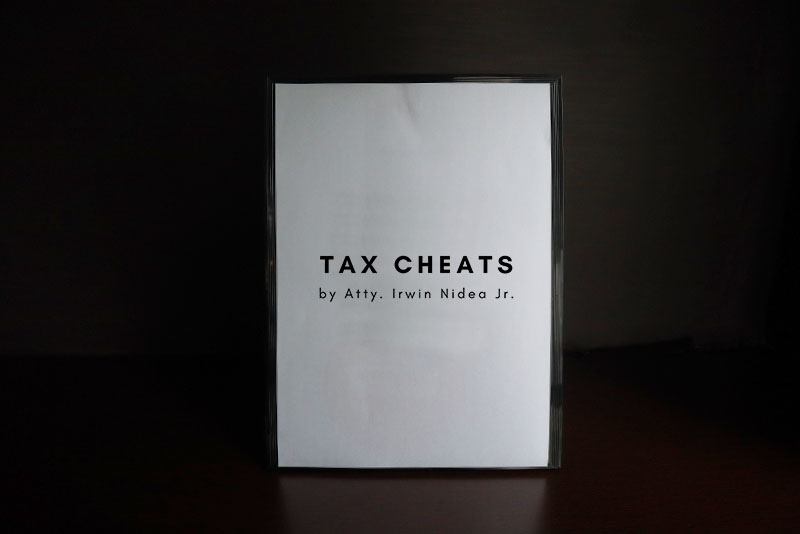
Tax Cheats
By Atty. Irwin C. Nidea Jr.
"Failure to file and pay the correct tax is not only a simple monetary debt but is a criminal act that deprives the guilty of the power to spend it."
Like any household, a government needs money. Whether we like it or not, we need to pay our taxes if we want our country to survive. But some citizens try to evade paying what is due. The government, led by the Bureau of Internal Revenue (BIR) is relentless in pursuing collection via summary remedies or by filing criminal actions in court.
 In summary remedies, taxpayers are accorded due process, which includes the issuance of assessment notices. The procedure is quite tedious, which includes the issuance of Notice for Informal Conference, Preliminary Assessment Notice and Final Assessment Notice, that defines the legal and factual bases of the tax assessment. The taxpayer is given the opportunity to controvert the tax assessment. He is also given the opportunity to defend himself by answering the series of notices mentioned above. In all these steps, a taxpayer is given the opportunity to defend himself and to controvert the BIR’s findings. The BIR is required to observe due process. Failure by the BIR to respect the taxpayer’s right to due process voids the assessment. Thus, the BIR must make sure that the NIC, PAN and FAN are properly received by the taxpayer. The BIR must also make sure that the taxpayer is afforded the opportunity to file a reply to all these notices.
In summary remedies, taxpayers are accorded due process, which includes the issuance of assessment notices. The procedure is quite tedious, which includes the issuance of Notice for Informal Conference, Preliminary Assessment Notice and Final Assessment Notice, that defines the legal and factual bases of the tax assessment. The taxpayer is given the opportunity to controvert the tax assessment. He is also given the opportunity to defend himself by answering the series of notices mentioned above. In all these steps, a taxpayer is given the opportunity to defend himself and to controvert the BIR’s findings. The BIR is required to observe due process. Failure by the BIR to respect the taxpayer’s right to due process voids the assessment. Thus, the BIR must make sure that the NIC, PAN and FAN are properly received by the taxpayer. The BIR must also make sure that the taxpayer is afforded the opportunity to file a reply to all these notices.
But the BIR may also decide to file criminal action before the Department of Justice, instead. When this happens, the notices enumerated above may not be necessary, especially if the ground is failure to file and pay tax returns. When this happens, the focus of the BIR is now criminal prosecution for violations of the Tax Code. The BIR may choose to file a complaint before the Department of Justice prior to the issuance of the Letter of Authority (LOA), PAN and FAN. The taxpayer will have the opportunity to defend himself. But as we all know, the standard of proof to prove the guilt of taxpayers is quite high in a criminal prosecution.
To be convicted for the offense of willful failure to supply correct and accurate information in a tax return, the following elements must be present: 1. The accused is a person required under the Tax Code or rules and regulations to supply correct and accurate information; 2. The accused failed to supply correct and accurate information at the time or times required by law or rules and regulations; and 3. The failure to supply correct and accurate information is willful.
It is important to note that the failure to supply the correct information must be willful. Here, the court will determine the intent of the taxpayer to evade payment of tax. The determination of whether there was willful intent not to pay tax only applies in cases where a tax return was actually filed. What if the taxpayer did not file the required tax return at all?
When this happens, the BIR must only prove that the required tax return was not filed. Civil and criminal actions may be pursued at the same time. The government only needs to show in court that the tax return was not filed. So, whether the failure to file the tax return was willful or not is irrelevant. The court only needs to determine if you are required to file and pay the tax return and you failed to do so.
Tax is the primary source of funds of any country. It is said to be the blood that gives life to all branches of government. That is why, every citizen is required to contribute. Failure to file and pay the correct tax is not only a simple monetary debt but is a criminal act that deprives the guilty of the power to spend it.
The author is a senior partner of Du-Baladad and Associates Law Offices, a member-firm of WTS Global.
The article is for general information only and is not intended, nor should be construed as a substitute for tax, legal or financial advice on any specific matter. Applicability of this article to any actual or particular tax or legal issue should be supported therefore by a professional study or advice. If you have any comments or questions concerning the article, you may e-mail the author at This email address is being protected from spambots. You need JavaScript enabled to view it. or call 8403-2001 local 330.



